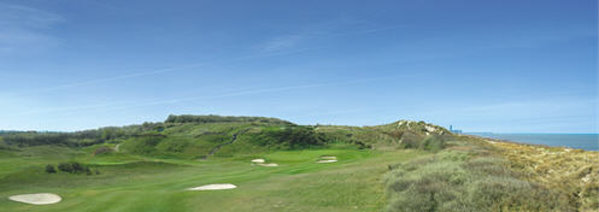
Golf in Flanders is standing on great ground, elected as ‘Sport of the Year’ for 2013, poised to add more players to the current tally of 34,000 in the region and already home to 54 courses across a diverse range of natural landscapes.
Recently, two esteemed courses were recognized for their great golf environments and high standard of sustainability. Royal Ostend and Golf Puyenbroeck were awarded the ‘Golf and the Environment’ distinction in Flanders, and GEO Certified™, the ecolabel for sustainability in golf worldwide.
Golf Puyenbroeck is a new course, not quite ten years old, built and operated by the province of East Flanders. Leading up to their application for GEO Certified™ the facility has had a long-standing commitment to enhancing nature, responsible resource consumption, and pride in its integrated role in the community. Future plans include adding renewable energy from wind turbines and photovoltaic panels.
Hilde Bruggeman, deputy for sport in the province of East Flanders: “This recognition proves that even at a public course environment like Puyenbroeck, sustainability and sports go hand in hand. The province of East Flanders is a pioneer in this area and wants to continue down this path.”
Sustainability is equally at home at the historic Royal Ostend Golf Club, a traditional membership-based golf club established in 1903. For over 100 years the club has cared for their ecologically valuable area of protected coastal land, and are now achieving international recognition for their sustainable stewardship.
Jean-Philippe Schepens of Royal Ostend: “GEO recognizes our vision on landscaping, and appreciates our nature conservation program at our beautiful club that is located in a unique place. For many years the land has been very valuable, with certain rare species only occurring with ecologically sound management.”
Royal Ostend has demonstrated great protection of the fragile ‘links’ ecosystem, and conservation of local biodiversity. The club also proactively managed a downward trend in renewable electricity consumption supplied by the grid every year since 2009, thanks to a new energy saving heating system and a determined focus in all areas of the club.
Marc Geens, the GEO accredited independent Verifier who visited both facilities said: “I was distinctly impressed by the ecological awareness of both clubs, and being part of large recreational areas, they did well to develop additional opportunities within the course boundaries for non-golfers. These two clubs demonstrate how golf can not only advocate, but really be a model for sustainable management, showing people what’s possible and how to care for their environment.”
VVG & GEO partnership
The Flemish Association for Golf (VVG) has been in partnership with the Golf Environment Organization (GEO) since 2011, working together to support sustainability within the golf industry in Flanders; linking the regional ‘Golf and the Environment’ initiative and the globally recognized ecolabel, GEO Certified™.
Marc Verneirt, Secretary-General of the VVG and ambassador for sustainable golf in Flanders for many years: “The Flemish Association for Golf has always made considerable efforts to merge golf and the environment and to promote sustainability within golf management. Our efforts with GEO are mutually compatible and help to reinforce sustainable golf.”
Piet Vandenbussche, Chairman of the VVG Committee on Spatial Planning and the Environment expressed his support: “GEO Certified™ is a very accessible program, without too much bureaucracy for our members, and it brings the principle of sustainability into the heart of the decision-makers of our clubs. The programme also makes use of independent auditors and includes a transparent and comprehensive method of public reporting. In Flanders, the public and the government has high expectations in terms of the environment, and GEO Certified™ helps to guarantee the people and policies that sustainability in golf is important.”
Jonathan Smith, Chief Executive of GEO: “The Flemish Association for Golf has shepherded a great deal of awareness and progress in Flanders among clubs and members, through consultation, work with government, awarding local distinction, and now also connecting clubs with the practical guidance and international recognition that GEO brings. We are looking forward to amplifying these efforts by continuing our work together.”


